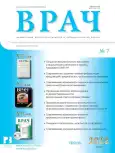Лечение женщин с климактерическим синдромом: альтернатива менопаузальной гормонотерапии
- Авторы: Сергеева-Кондраченко М.Ю.1
-
Учреждения:
- Пензенский институт усовершенствования врачей - филиал Российской медицинской академии непрерывного профессионального образования Минздрава России
- Выпуск: Том 33, № 7 (2022)
- Страницы: 35-40
- Раздел: Фармакология
- URL: https://journals.eco-vector.com/0236-3054/article/view/114650
- DOI: https://doi.org/10.29296/25877305-2022-07-07
- ID: 114650
Цитировать
Полный текст
Аннотация
Патологическое течение менопаузы (у 26-48% женщин) сопровождается сосудистыми, эндокринно-обменными и нейропсихическими нарушениями, что способствует развитию соматической патологии и значительно снижает качество жизни. Оно рассматривается как мультифакторное заболевание, в развитии которого ведущую роль играют нарушения вегетативной и гормональной регуляции, снижение адаптационных резервов гипоталамуса и недостаточная его приспособляемость к изменившимся условиям функционирования гипоталамо-гипофизарно-яичниковой системы. Назначение менопаузальной гормональной терапии не всегда возможно, поэтому поиск средств альтернативной терапии климактерического синдрома остается крайне актуальным. В этой области одним из перспективных растительных препаратов является Фемо-Клим (компания Парафарм, Россия) - это средство, воздействующее одновременно на оба рычага возникновения климактерических симптомов - дефицит эстрогенов и недостаток тестостерона. Приводятся результаты собственного исследования по оценке изменений когнитивной функции и показателей качества жизни у женщин постменопаузального периода на фоне использования натурального негормонального препарата Фемо-Клим.
Ключевые слова
Полный текст
Об авторах
М. Ю. Сергеева-Кондраченко
Пензенский институт усовершенствования врачей - филиал Российской медицинской академии непрерывного профессионального образования Минздрава России
Автор, ответственный за переписку.
Email: marserkon@mail.ru
доктор медицинских наук, профессор
Список литературы
- Джоунс О., Струков В., Кислов А. и др. Коморбидный остеопороз: проблемы и новые возможности терапии (ч. 2). Врач. 2017; 11: 25-8.
- Менопаузальная гормонотерапия и сохранение здоровья женщин в зрелом возрасте. Клинические рекомендации (Протоколы) Министерства здравоохранения Российской Федерации. М., 2014; 42 с.
- Сергеева-Кондраченко М.Ю., Болотина Т.П. Качество жизни больных с сахарным диабетом 2 типа. Актуальные вопросы диагностики, лечения и реабилитации больных. Мат-лы XVII научно-практ. конф. с междунар. участ. Сб. статей. Пенза, 2014; с. 170-1.
- Сухих Г.Т., Сметник В.П., Андреева Е.Н. и др. Менопаузальная гормонотерапия и сохранение здоровья женщин в зрелом возрасте. Клинические рекомендации. М., 2016.
- Хабибулина М.М. Влияние альтернативного варианта заместительной гормональной терапии на кардиальные проявления при метаболически здоровом ожирении и гипоэстрогенемии. Фармация. 2022; 71 (4): 46-51. doi: 10.29296/25419218-2022-04-07
- Юренева С.В., Ильина Л.М. Практическое руководство для врачей по ведению женщин в переходном периоде и в постменопаузе (по материалам обновленных российских и международных рекомендаций). М.: АО «Байер», 2017; 99 с.
- Яковец С.М., Лызикова Ю.А. Медико-биологические аспекты климактерия. Проблемы здоровья и экологии. 2013; 1 (35): 51-7.
- Baber R.J., Panay N., Fenton A. et al. The IMS Writing Group 2016 IMS Recommendations on women’s midlife health and menopause hormone therapy. Climacteric. 2016; 19 (2): 10950. doi: 10.3109/13697137.2015.1129166
- Lobo R.A., Davis S.R., De Villiers T.J. et al. Prevention of diseases after menopause. Climacteric. 2014; 17 (5): 540-56. doi: 10.3109/13697137.2014.933411
- Maki P.M. Review article. Verbal memory and menopause. Maturitas. 2015; 82 (3): 288-9. doi: 10.1016/j.maturitas.2015.07.023
- McCarrey A.C., Resnick S.M. Postmenopausal hormone therapy and cognition. Horm Behav. 2015; 74: 167-72. doi: 10.1016/j.yhbeh.2015.04.018
Дополнительные файлы






